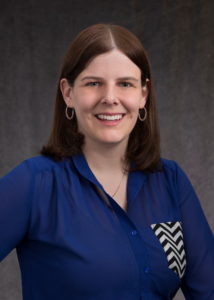Rare Neurological Diseases HSR Laboratory

Vanessa Merker, PhDTitle
Vanessa Merker, PhD is a mixed-methods health services researcher committed to improving care for patients with rare, neurological disorders. She currently works as a post-doctoral fellow at the Center for Healthcare Organization and Implementation Research at the Edith Nourse Rogers Memorial Veterans Hospital in Bedford, MA.
Dr. Merker’s research leverages information collected directly from patients and their caregivers to improve healthcare delivery and research. Her current research focus is on 1) supporting patient engagement/involvement in research; 2) developing and incorporating patient reported outcome measures into clinical trials and routine care; and 3) understanding and addressing barriers to receiving high quality healthcare faced by patients with rare neurological disorders. Dr. Merker has particular interests in qualitative research, implementation science, and engagement science.
Dr. Merker collaborates closely with the Family Center for Neurofibromatosis at Massachusetts General Hospital (https://www.massgeneral.org/neurology/treatments-and-services/neurofibromatosis-clinic). The neurofibromatoses [NF] (which include NF1, NF2, and schwannomatosis) are rare, neurogenetic disorders which cause people to develop multiple nerve sheath tumors throughout their body. Depending on which type of NF a person has, they may also experience learning difficulties, deafness, chronic pain, and a variety of other symptoms. Dr. Merker received funding from the NCI-funded Program in Cancer Outcomes Research Training and the Children’s Tumor Foundation to conduct her doctoral research in understanding the diagnostic process for schwannomatosis (available at https://hdl.handle.net/2144/34802). Ongoing projects with the NF clinic include assessing physician agreement with neurofibromatosis care guidelines and determining the extent to which neurofibromatosis patients nationwide receive guideline-concordant care; measuring patients’ geographic access to neurofibromatosis specialty clinics; and understanding barriers to receiving genetic testing.
Dr. Merker is also actively involved in the Response Endpoints in Neurofibromatosis and Schwannomatosis (REiNS) International Collaboration, where she is currently a member of the Directors’ Council and incoming chair of the Patient Reported Outcomes Working Group. REiNS is a volunteer organization of clinicians, researchers, patient representatives, and other stakeholders who select and validate endpoints for use in clinical trials for neurofibromatosis. By doing so, the group aims to standardize outcome measurement across institutions and improve the relevance of data collected during trials. Dr. Merker has been a key facilitator for the involvement of patient representatives in REiNS, and she is currently leading a participatory evaluation of the patient representative program. REINS patient representatives are full partners in designing the evaluation, analyzing evaluation data, and brainstorming & implementing program improvements based on this data. For more information about REINS, visit our website at https://ccrod.cancer.gov/confluence/display/REINS/Home
Dr. Merker’s research leverages information collected directly from patients and their caregivers to improve healthcare delivery and research. Her current research focus is on 1) supporting patient engagement/involvement in research; 2) developing and incorporating patient reported outcome measures into clinical trials and routine care; and 3) understanding and addressing barriers to receiving high quality healthcare faced by patients with rare neurological disorders. Dr. Merker has particular interests in qualitative research, implementation science, and engagement science.
Dr. Merker collaborates closely with the Family Center for Neurofibromatosis at Massachusetts General Hospital (https://www.massgeneral.org/neurology/treatments-and-services/neurofibromatosis-clinic). The neurofibromatoses [NF] (which include NF1, NF2, and schwannomatosis) are rare, neurogenetic disorders which cause people to develop multiple nerve sheath tumors throughout their body. Depending on which type of NF a person has, they may also experience learning difficulties, deafness, chronic pain, and a variety of other symptoms. Dr. Merker received funding from the NCI-funded Program in Cancer Outcomes Research Training and the Children’s Tumor Foundation to conduct her doctoral research in understanding the diagnostic process for schwannomatosis (available at https://hdl.handle.net/2144/34802). Ongoing projects with the NF clinic include assessing physician agreement with neurofibromatosis care guidelines and determining the extent to which neurofibromatosis patients nationwide receive guideline-concordant care; measuring patients’ geographic access to neurofibromatosis specialty clinics; and understanding barriers to receiving genetic testing.
Dr. Merker is also actively involved in the Response Endpoints in Neurofibromatosis and Schwannomatosis (REiNS) International Collaboration, where she is currently a member of the Directors’ Council and incoming chair of the Patient Reported Outcomes Working Group. REiNS is a volunteer organization of clinicians, researchers, patient representatives, and other stakeholders who select and validate endpoints for use in clinical trials for neurofibromatosis. By doing so, the group aims to standardize outcome measurement across institutions and improve the relevance of data collected during trials. Dr. Merker has been a key facilitator for the involvement of patient representatives in REiNS, and she is currently leading a participatory evaluation of the patient representative program. REINS patient representatives are full partners in designing the evaluation, analyzing evaluation data, and brainstorming & implementing program improvements based on this data. For more information about REINS, visit our website at https://ccrod.cancer.gov/confluence/display/REINS/Home
